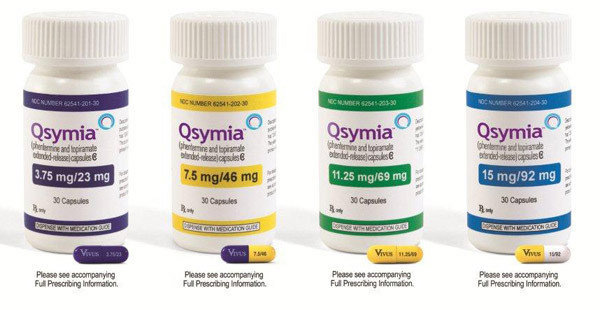The new weight loss pill Qsymia may have started off with slow sales, but it has started to see those numbers rise. Prescriptions filled for the recently approved weight loss drug have climbed to about 2,000 prescriptions per week.
Qsymia was the first weight loss drug approved by the FDA in 13 years when it got the OK this summer. It was approved for adults with a BMI of 30 or more – categorizing them as obese – and for those with a BMI of 27 or more who have been diagnosed with at least one obesity-related illness, such as high cholesterol or type 2 diabetes. The pill, which went on sale this past September, was made to suppress the appetite and cause weight loss – as much as 10 percent body fat – for obese individuals. It’s combined with phentermine and topiramate, which are two different drugs made to suppress the appetite and give more of a full feeling in the stomach. Qsymia is prescribed to be combined with regular exercise and a healthy, calorie reduced diet. Whether it’s a miracle drug or a disaster varies from person to person.
One person in favor of the drug is a 57-year-old woman named Gwen Barton who decided to try the weight loss pill for Vivus, the creator of the pill. Barton ended up losing 50 pounds in about 18 months. When she stopped using it, she gained about half of that back. She recently decided to start taking it again earlier this month and began seeing results right away.
“I have lost 12 pounds so far and I’m very happy,” said Barton in a story at WebMD. Barton’s 5-foot-5-inch frame currently weighs 180 pounds, with a goal in mind of 140 pounds. She claims that she has given up soda, fatty foods and her favorite…doughnuts. She drinks lots of water and walks for the exercise portion.
One of those who is not so fond of the drug is Sidney Wolfe, MD, director of Public Citizen’s Health Research Group. His opinion from the get-go was that the drug is a “reckless” idea, which is an opinion that has yet to change. “This history of diet drugs is a disaster,” said Wolfe. “It is magical and delusional thinking for anyone to believe that a drug will turn off hunger without hitting other targets where it will do harm, usually to the cardiovascular system.”
You can back up that statement by looking at Gwen Barton’s history with the drug. Like most users of diet pills, prescription or otherwise, once use stops people see the weight come back on. Without lifestyle changes, including behavior and mental health support, you’re not likely to keep the weight off. Our own resident pharmacist, Dr. Sarah G. Khan, echoed these sentiments when Qsymia first debuted.
“Permanent weight loss takes time and replacing unhealthy habits with better ones is a process,” said Dr. Khan. “I wish anyone luck who is willing to try these medications, but I think getting to the root of the problem of why we eat so much and with so little nutritional value, or why we don’t make time to exercise, is what we should be focusing on. This is a similar situation to how we treat mood disorders with medication and not enough behavioral counseling.”
On the other hand, Peter Galier, MD, an internal medicine specialist at the UCLA Medical Center, Santa Monica, California, has mixed feelings on the drug. He views it as an advantage and opportunity to get better control of one’s diet. However, he has witnessed individuals who have taken the pill lose a decent amount of weight within the first month or two, but the weight loss seems to come to a halt once the body adjusts to the drug. Once this happens, the weight can easily be put back on again and sometimes even more than what the individual first began with.
“I often then see more weight gain than where they started,” said Galier at WebMD. He suggests for his patients to take advantage of the appetite suppressing effects to help them get their diet in order and begin an exercising routine.
Qsymia was one of the six “miracle diets” that Dr. Oz recommended this year, but we hope to see more people turning to long-term weight loss solutions.
Also Read:
Contrave is a New Weight Loss Drug Promising to End Cravings
Sensa’s False Advertising Costs Them $800,000

